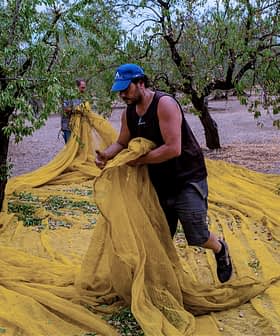Study Finds Treatments Reduce Symptoms But Do Not Eliminate Xf in Olive Trees
The European Food Safety Authority (EFSA) has concluded that treatments used on olive trees in Apulia (Puglia) affected by the bacteria have resulted in a reduction in symptoms, but are not successful in eliminating the disease.
 The effect of Xf on grape leaves
The effect of Xf on grape leavesAn evaluation by the European Food Safety Authority (EFSA) has concluded that treatments being used on olive trees in Apulia (Puglia) affected by the bacteria Xylella fastidiosa have resulted in a reduction in symptoms, but are not successful in eliminating the disease.
A press release published by EFSA revealed details of a statement adopted by EFSA’s expert Panel on Plant Health outlining its opinion on treatment solutions for plants infected by Xf. The evaluation was conducted in response to a request by the European Commission for scientific advice in response to questions about its control strategy against Xf in the Apulia region.
EFSA’s panel evaluated two different experimental treatment methods currently being carried out in Apulia by two separate groups of researchers. The first group from the University of Foggia has been treating olive trees infected with Xf with bioactive compounds which are applied after extensive pruning of the trees. Five months after the treatment, the trees quickly grew new branches with new leaves free of symptoms, and produced good crops.
The other treatment method is being carried out by researchers from CREA (Consiglio per la ricerca in agricoltura e l’analisi dell’economia agraria) and involves using a commercial product of zinc, copper and citric acid to treat infected olive trees. Positive results were also seen here, with the trees surviving the summer of 2015 and the following winter.
These experimental treatments were tested for their effectiveness in suppressing disease symptoms only, and according to the researchers, the positive results can be considered to be only preliminary, and that further treatments would need to be tested over the course of another growing season.
EFSA’s expert panel agrees that the long-term effectiveness of these treatments has not been established, and further studies of treatments spread over several growing seasons would be required to arrive at a conclusion about their sustainability. But the panel does acknowledge in its statement the positive effects of such treatments in potentially prolonging the life of olive trees, especially in the infected zone in Apulia which is currently under containment.
EFSA’s panel also examined treatments used in other parts of the world to control bacterial infections in olive trees as well as grapevines, and citrus, apple and pear trees. It found that results seen in Apulia are consistent with experience from other parts of the world and confirmed that though there are treatments that can reduce its symptoms, there is no treatment to eliminate Xylella fastidiosa.







